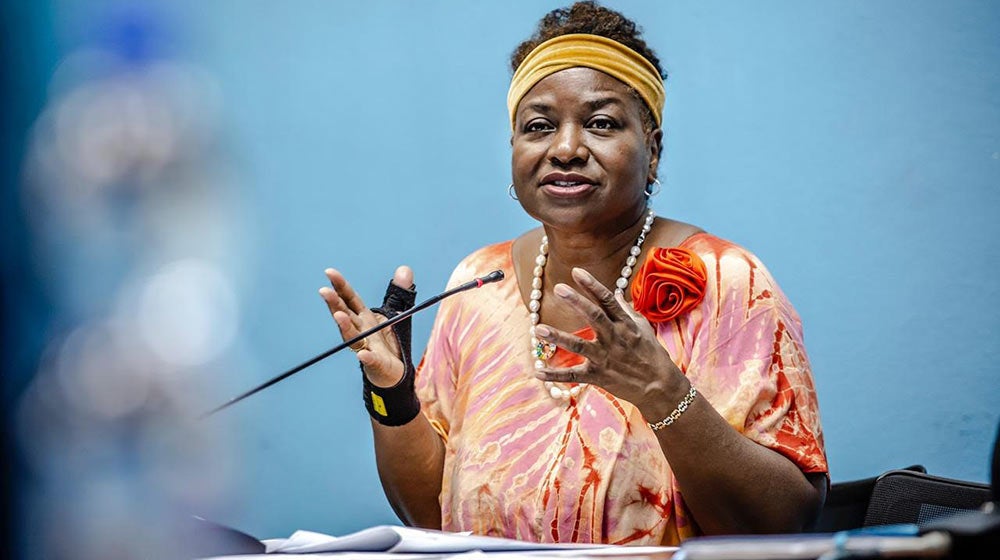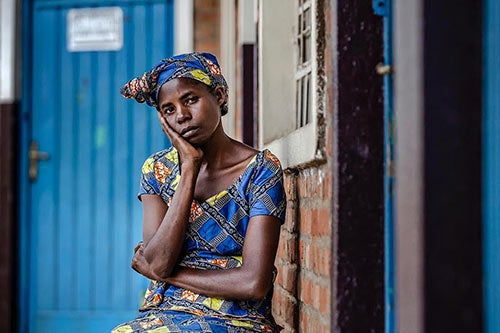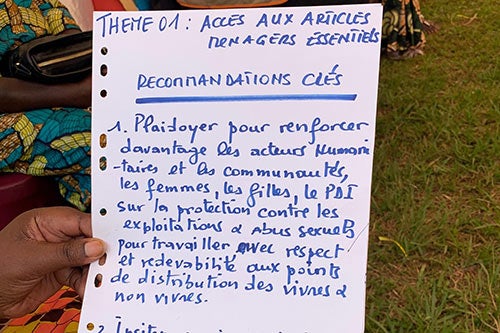Serving survivors of sexual violence in the Democratic Republic of the Congo

BUKAVU, Democratic Republic of the Congo – “We waited for hours in the distribution point until they finally told us to go home. Hungry and empty-handed, I walked with three other women and two little girls. It was dusk, and I heard the little girls scream.
“I turned around and, in the dim light, I saw men and boys coming towards us. They grabbed us and they were jeering when they distributed us among them, including the children. Five men took turns raping me and violating my body. My last thought before I lost consciousness was how pure evil can exist in this world.”
Larise*, an internally displaced person from Eastern Congo, told this wrenching story to UNFPA Executive Director Dr. Natalia Kanem when she visited the area.
After sharing her story, Larise handed Dr. Kanem a creased picture showing her battered body in the aftermath of the assault. “I was in the hospital for five months. The men broke my body into many pieces and shattered my soul.”
Women and girls caught in the middle
Tragically, this horrific event is all too common. The Democratic Republic of the Congo has one of the world’s most protracted and complex humanitarian crises. More than 5 million people are displaced and communities continually face armed conflict, violence, and insecurity.

“This is not just a perfect storm of a humanitarian crisis – it goes beyond that, as the magnitude is catastrophic,” said Dr. Kanem, who came to listen to the voices and needs of survivors of sexual violence in the Congo. She recently became the head of the Inter-Agency Standing Committee Champion on the Protection from Sexual Abuse, Exploitation and Harassment. This committee leads the UN system’s humanitarian efforts to protect the rights of women and girls.
“Women and girls are caught in the middle, paying a heavy price with their rights, their bodies and their lives,” she said.
Overlapping crises
The Democratic Republic of the Congo is the second largest country in Africa. It is also one of the most populated and is rich in natural resources. Yet, 65 percent of the population lives below the poverty line.
Tens of millions of people are estimated to need humanitarian aid. Cholera, measles, yellow fever, Ebola, and COVID-19 have further weakened the already fragile health system. Today, staggering numbers of women and girls are at risk of sexual violence in the Congo. Women are also at greater risk of pregnancy and childbirth complications, including death.
These overlapping crises require sophisticated collaboration. “We are looking at humanitarian interventions that pave the way for the longer-term objectives of advancing human rights and gender equality, building social cohesion, and sustaining peace,” Dr. Kanem said.
“As the carrier of the torch for justice and peace for all young women and girls – and not just in the Democratic Republic of the Congo – we have to look into three priorities: bolstering our mechanisms; improving victims’ access to quality assistance and information; and strengthening our coordination and cohesion.”
Lighting the way forward
Throughout her visit, women sobbed as they shared their stories – one appalling tale after another. Their experiences were united by a common thread: each of the women had experienced sexual violence in the Democratic Republic of the Congo.

But these women were not passive victims. They have demanded change. Together, the women recommended ways to minimize the risk of sexual abuse and exploitation. Interventions included improved access to services and better accountability during the distribution of non-food items. They called for distributing and monitoring food more efficiently; involving women, girls, and persons living with disabilities in distribution committees; and providing micro-credits for small-scale businesses. They insisted that aid groups consult with women on the construction of water points to reduce women’s exposure to attack.
The recommendations also included the distribution and monitoring of cash aid. Women asked for financial empowerment programs for menstrual hygiene products and other essential items to prevent infections and survival sex.
Dr. Kanem promised to bring these proposals, and stories, to the highest levels. “From this day forward, I carry with me your recommendations. This will be our torch to light the way to making a safe place for women and girls.”
*Name changed for privacy and protection
UNFPA.org originally published a version of this article.